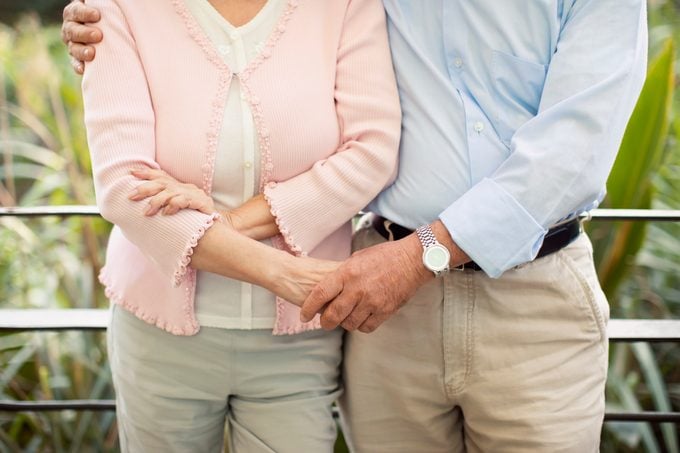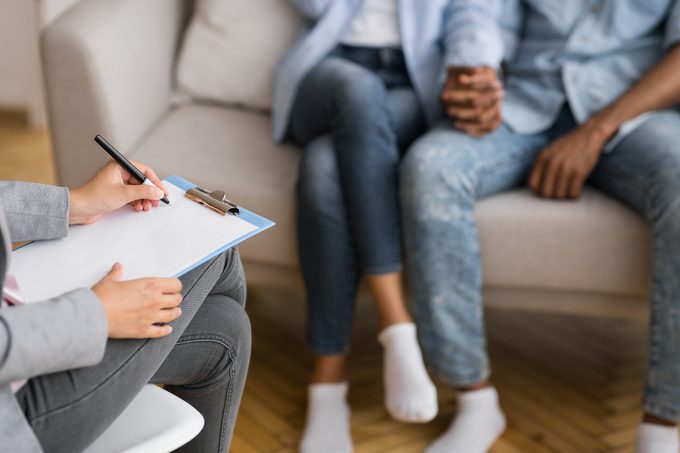13 Signs You’re in a Codependent Relationship
Updated: Jun. 30, 2021
A codependent relationship is one in which a partner assumes the role of the "giver" or "rescuer" while the other is the "taker" or "victim." Here's how to tell if you're in one.
What codependent relationships look like
“I’m the CFO of a company. I have multiple college degrees. I’ve never seen myself as a weak or dependent type of person,” says Karyl L., 38, of Chapel Hill, North Carolina. Yet this perception of herself was turned on its head when Jeff, her partner of 15 years, recently left her for another woman. (Here’s what you need to know about cheating.)
The couple had met shortly after college when Jeff was going through a rough patch and couch surfing at a friend’s apartment. “I pretty much fell in love that first day, it was those big, brown eyes and contagious sense of humor,” she says. Something else also attracted her to him on a deeper, almost subconscious level: How much he needed her. (Find out why you should break up with needy friends.)
“He was a wreck, he’d lost his job, he was living out of his car and eating raw Ramen every day,” she says. While that might have scared other women away, Karyl says she saw it as something she could help with and she threw herself into getting Jeff back on his feet. He moved into her apartment just two weeks after they first met and she’d been helping him ever since. She took care of him as he bounced from job to job, then started his own company, only to have to declare bankruptcy within a year.
“As a finance professional, I did everything I could to fix his money issues and he came out of the bankruptcy in a much better position. I was really proud of that,” she says. Which is why it came as such a surprise when he left her.

Cheating, resentment, and toxic relationships
“I’d spent most of my adult life taking care of him and managing his crises and then he had the audacity to cheat on me? In hindsight, I think he resented the fact that I was always fixing him,” she says.
For years she’d been so focused on how he needed her that Karyl hadn’t realized how much she’d come to need him too. “Everything I did revolved around Jeff, from what I chose to wear to what I read to who I hung out with. So when the relationship ended, when he left me, it was like he took my identity with him,” she says, “I was terrified. I didn’t know who I was without him. I remember yelling as he walked away ‘I can’t live without you!’ and I really believed it then.”
That statement, a popular Hollywood trope, may sound romantic, but it is a huge red flag, says Darylevuanie Johnson, psychologist and licensed professional counselor in Washington D.C., and adjunct professor of psychology at Montgomery College in Rockville, Maryland. “This signifies a type of unhealthy attachment called codependency,” she says. “It’s not loving but rather clingy and desperate.”
This type of relationship is far more common than people think. Numbers are hard to come by, largely because “codependent” isn’t a defined clinical term, but research estimates that anywhere from 50 to 90 percent of people demonstrate some codependent behavior, says Mayra Mendez, a licensed psychotherapist, marriage and family therapist, and program coordinator of mental health services at Providence Saint John’s Child and Family Development Center in Santa Monica, California.
What is codependency?
The term first became popularized in the 1950s and was used when talking about addiction, Mendez says. “It identified people who would want to help addicts trying to recover but would help so much they ended up enabling them, allowing the addiction to get worse,” she says. “It’s grown since then to be so broadly defined as to encompass nearly any kind of unhealthy relationship where one person is the ‘giver’ or ‘rescuer’ and the other is the ‘taker’ or ‘victim’.”
While the term is often used in describing romantic relationships, you can be in a codependent relationship with anyone—including a parent, a close friend, even a boss, Mendez says. “Really it’s describing an imbalance of power in a relationship, where one person is giving far more than they are getting,” she says. (Here’s what to do if your boss is a psychopath.)
“It can become incredibly toxic and is a warning sign that the relationship is in the danger zone,” Johnson says.
Benefits of being in a codependent relationship
You may wonder why anyone would want to be in a codependent relationship but the truth is that while it is overall unhealthy, this type of dynamic offers some potent benefits for both people, Mendez says.
“It’s a distraction from dealing with deep, painful issues,” she says. “The caretaker gets to avoid responsibility for dealing with their own issues by focusing on the other person, who also gets to avoid responsibility for their problems by giving them to the caretaker,” she says.
“Many ‘helpers’ stay because they have a deep need to be needed, wanted, and accepted,” she explains. “They also like to be seen as a hero or rescuer and that becomes part of their personality, who they are.”
“I was used to taking care of people, it just felt ‘right’ for me to be in that role and I felt lost when I didn’t have someone to take care of,” Karyl says. (Here’s how to practice self-care and carve out ‘me-time’)
How does codependency start?
Codependency is often the result of a person who during their primary years experienced family dysfunction or chronic states of stress, says Kristin Orlowski, PhD, licensed psychologist with UCHealth Family Medicine–Littleton, Colorado.
“Human beings have a primal need to connect with others and feel loved; therefore, when a person is raised in a dysfunctional family system their self-worth begins to develop based on the dynamics of how you get that love and connection,” she says. “The need for love often outweighs any other basic need including food and shelter, therefore these relationships can start to feel very intense and difficult to separate from.”
A child who has learned this pattern is more likely to re-engage in future dysfunctional relationships, increasing the risk of a cyclical pattern of codependency and can lead to abusive relationships, Orlowski says.
This is true for Karyl, who says she grew up in a chaotic military family with an abusive father and very passive mother. “I learned very quickly that if I wanted to be safe I needed to anticipate my dad’s moods and be ready to fix them,” she says. “I got so good at it that the family decided I was the only one who could ‘handle’ him so that became my job.”
It’s not just your childhood you need to think about. Adults who are dependent on alcohol or other substances, are economically disadvantaged, lack a social support system, or are otherwise in a vulnerable position are at a higher risk of ending up in a codependent relationship, she says. “The person may end up with a sense of learned helplessness making it difficult for them to believe that they can function in the absence of the relationship,” she says.
Signs you might be in a codependent relationship
Because it is so common, it’s likely you will see some signs of codependency in your own relationships, Mendez says. “Don’t panic, it’s a good thing to be able to recognize what codependent tendencies you may have,” she says. “Recognizing the pattern is the first step to healing it.”
She adds that codependent relationships exist on a spectrum and that most can be saved if both partners are willing to work on it.
You like your eggs the way they like their eggs
“Codependent givers tend to put their needs and preferences last,” Orlowski says, adding this may lead to becoming emotionally enmeshed, to the point where it’s hard to distinguish what you really want versus what your partner wants.
It’s also a way of seeking approval and validation from your partner. “For the longest time I told everyone that my favorite movie was Better Off Dead because that was Jeff’s favorite movie and I was afraid he wouldn’t want to watch movies with me if we didn’t have the same taste,” Karyl says. “Well, it turns out I hate 80s movies. Especially that one.”
You are constantly worried about your partner leaving you
If love felt conditional or arbitrary to you as a child, you may still have that fear of randomly losing your partner’s love, leading you to feel an overwhelming sense of desolation and emptiness without the other person, Orlowski says.
Even when they leave for short periods of time, you may feel an intense anxiety that they won’t come back. “I would track Jeff via an app on our phones so I always knew where he was,” Karyl says. “I told myself it was because I wanted to make sure he was okay but really it was to make myself feel better. I would get really anxious if the app wasn’t working for some reason.”
You text your partner every hour
Some couples send each other funny memes all day or use texting to coordinate complicated schedules. However, if you’re sending a blizzard of texts to check in on your partner and you feel upset when they don’t answer right away, you may be codependent, Mendez says.
“You’re looking for that little hit of validation, that they still need and want you,” she says. It can also be used as a way to try and control or monitor your partner when they are away from you. (Find out if your partner is gaslighting you.)
You will do anything to avoid being alone
Codependent people have a deep need to always be with the dysfunctional person in order to avoid being alone, Orlowski says. You may hate the feeling of being alone, get very anxious on your own, or feel like you don’t know what to do with yourself. You may even feel like you’re not yourself without your partner. Codependent people may have a disruption in their identity formation, preventing the healthy formation of personality, as they enmesh with those of others,” she says.
You see your partner as a project
“The carer often tries to fix their partner and has a list of things they’d like to change or improve in them,” Mendez says. Karyl says this was an almost daily point of contention in their relationship.
“I just wanted for him to be better, I could see all this potential in him and I thought I was building him up by showing him what he could be,” she says. “He would accuse me of being nitpicky and controlling.”
You know what your partner’s favorite restaurant is but they don’t know yours
Codependent relationships are a one-way street, with the carer doing almost all the giving. This means they are very attentive to their partner’s needs and minimize their own, Johnson says.
“If your needs aren’t getting met, then your partner isn’t invested in your happiness and that is not a healthy relationship,” she says.
You pay your partner’s parking tickets
“People in the ‘rescuer’ role will assume responsibility for things that are not in their control at all,” Mendez says.
So if you are constantly cleaning up your partner’s messes, literally and figuratively, or apologizing for them to others, that’s a red flag.
You’re secretly worried about their promotion
“In very dysfunctional codependent relationships, the carer may actually thwart their partner’s success in order to maintain the status quo,” Mendez says.
You may think that you know better what your partner needs than they do and may interfere in their professional or social lives to keep them close, she adds.
You have a difficult time choosing a cellphone plan
“I was always so worried about pleasing Jeff that if I didn’t know what he would want me to do, I would get really upset and worry that he wouldn’t be happy with me,” Karyl says.
This manifested in an almost paralyzing fear of making independent decisions at home, including small ones like to wear or which food to take for lunch, she says. This indecisiveness extended to larger decisions like what car to buy, where to go on vacation, and what type of life insurance policy to get, she says.
“It ends up being with one person living solely to please the other,” Mendez says.
You have a tough time with boundaries
People prone to codependency will often have a history of very intense, volatile relationships, Orlowski says. This stems from an inability to differentiate your own feelings from those of your partner, family member, or friend, blurring boundaries and leading to confusion and anger.
When someone asks how you are doing, you aren’t sure how to answer
“A person who is in a codependent relationship often has difficulty appropriately communicating their own thoughts and feelings, but rather start to take on those of others in order to seek a sense of acceptance, connection, and self-worth,” Orlowski says.
“How I was doing on any given day depended entirely on how Jeff was doing,” Karyl says. “I thought I was just empathizing with him but I would actually substitute his feelings for my own.” (She’s not the only one who’s mistaken codependency for empathy.)
You feel very down about yourself
Children who grow up having their worth dependent on what they do or offer may grow up to be “givers,” defining themselves exclusively by what they can do to help others, Mendez says.
This may appear altruistic at first but it’s often the result of very low self-esteem, she says. (Here’s how to boost your self-confidence instantly.)
There’s domestic abuse
Codependent relationships are more likely to include some type of abuse, including physical, sexual, financial, or emotional, Orlowski says.
The person in the “taking” role may become exploitative, erratic, and even violent, while the person in the “giving” role will accept it because it gives them the attention they seek, even if it’s negative, Mendez says.

What to do if you think your relationship is codependent
For people in the “giving” role, the first step in resolving codependency is to help them feel empowered to challenge their self-critical thoughts and build up their sense of self-worth so that they are not dependent on the validation of others, Orlowski says. One way to do this is to try a new hobby that brings you a lot of joy, independent of your partner, which can increase self-confidence and independence. (Are you a pushover? Here’s how to stand up for yourself.)
For people who feel stuck in the “taking” role, start by establishing a healthy support system so you aren’t reliant only on your partner and learn to take care of yourself, Orlowski says. It’s also important to develop empathy and improve your listening skills so you can learn to see your partner’s needs and wants, Mendez says.
For Karyl, the key to overcoming her deep-seated codependency issues was “lots and lots of therapy.” Therapy can be a powerful tool for helping you see the codependent traits that are easy to miss in yourself and to challenge your negative thoughts about yourself, Mendez says.
Karyl recently entered into a new relationship, one that feels more equal she says. “I don’t feel like I have to fix him because I finally fixed myself, I don’t need that validation,” she says. “Now when I want to do something nice for him, it’s out of love, not fear. And he’s great about reciprocating.”

